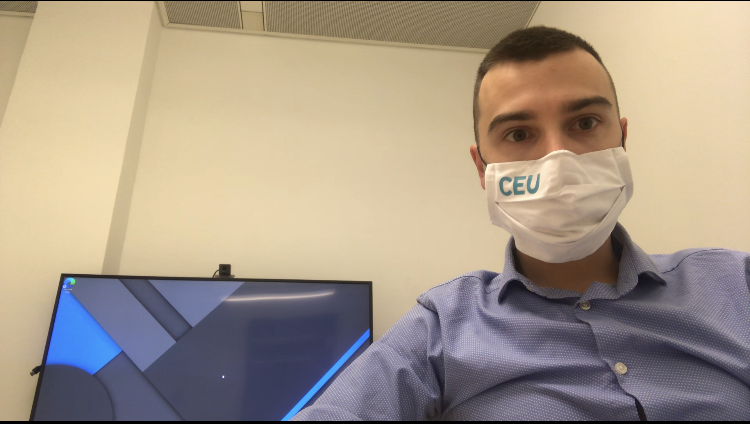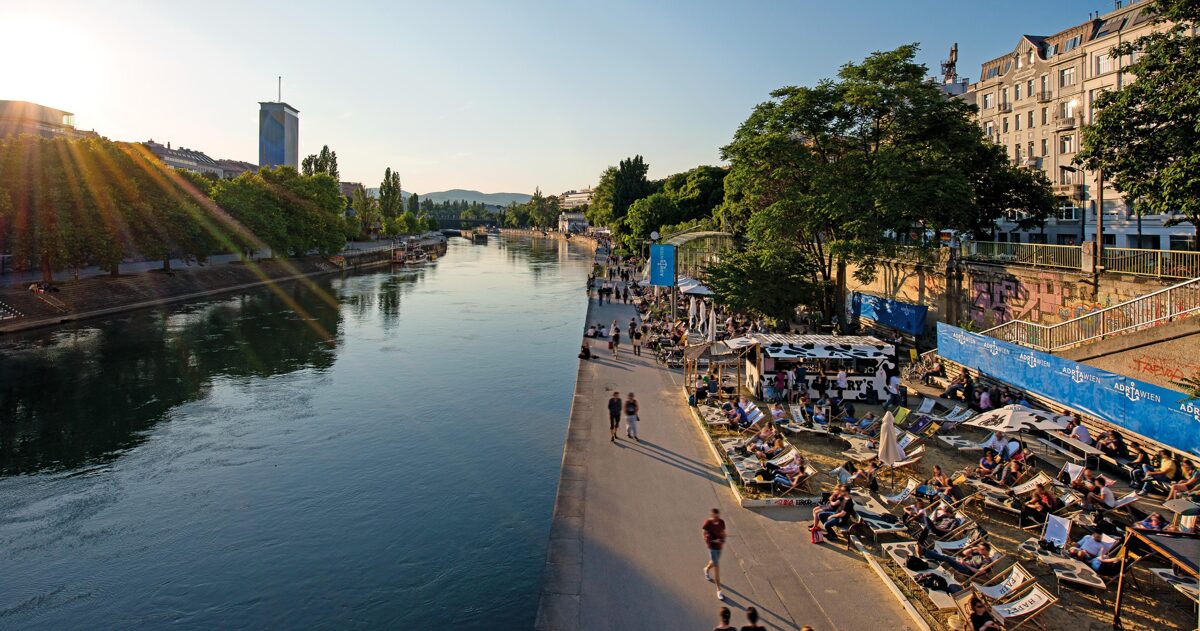Is There a Democracy at CEU - Perspective of a Student Representative?
Photo: CEU, www.ceu.edu
In almost all universities in the world, some kind of student representation is present. In some student representatives only have a consultative role and observer status in governing bodies of the university, while in some cases student representatives hold voting rights and can effectively influence the decision-making process. This is a story about the Central European University in Vienna (previously Budapest) on the state of play of student representation and possibilities that students of this university at their disposal.
All students wishing to become student representatives have the chance to do it through democratic elections. There are elections organized for all three types of representatives at the end of September and the beginning of October. All candidates have their small campaigns, post placards with their pictures around the campus, create their slogans and programme, and finally, in case of the Senate elections - have their speeches and debates. Last year debate of candidates for Senate was organized online, through MS Teams where all other students could watch all the speeches. Elections are organized online, where the electorate can cast their votes for their favourites. Those with the most votes are declared as winners at the end of the process.
Briefly, there are several levels of representation within the CEU. Each and every studying programme has at least one student representative that represents his cohort, participates in meetings organized by Student Union, his faculty or departments and town hall meetings which are organized by the Heads of Departments on several occasions during each semester. Furthermore, the Student Union is a student organization that is open for all students to join. the Student Union has its president and vice-president, governing board and different committees that represent student interests, organize various events and regularly communicate with Heads of Departments and Senior Leadership of the University. Finally, the Academic Senate of the CEU is the highest representative body of the University, consisting of 15 members, out of which three are students. One student represents all PhD level programmes, one represents one-year MA programmes and the third represents two-year MA programmes. Starting from the academic year 2021/22 there will be one student representing BA programmes.
This blog will mainly analyze the activity of student representatives in the Senate, but will also touch upon other types of representation at the CEU. First and foremost, although student representatives in the Senate are a minority, they are treated as equal partners with all other members: professors, pro-rector and the president. This is the first indicator of democracy at CEU. Students in the Senate are taken seriously, while their proposals and initiatives are received with deserved attention and understanding from other senators. Accepting the initiative launched by students in 2020 for introduction pass/fail marks due to increased stress and anxiety due to the pandemic and online studying confirms that students interests are represented and received in a democratic manner. Democratic debate on Senate session enabled students to present their initiative thoroughly to other senators and win support.
In the academic 2020/21 students senators had the opportunity to participate in some very important decisions regarding the management of the CEU. For instance, Senate has discussed several proposals for the transformation of the Otto Wagner-designed Steinhof Hospital into the permanent CEU campus in Vienna. The decision was made that KPF would be the architect in charge of creating the most modern campus in Europe. But student representatives have noticed shortcomings in the overall construction plan regarding the area of securing the unimpeded movement of students with handicaps. This problem was presented at one of the Senate meetings, and Senate authorized the creation of the working group consisted of students, university staff and KPF representatives which solved the problem after a few months of joint work. The second example of students participating in making long-term decisions would be the election of the new President. Student representatives had the opportunity to present their stance on three shortlisted candidates, resulting in the new President being supported by all student representatives.
During the last academic year, the Student Union had also a lot of business to finish. As the Uni moved from Budapest to Vienna, the Student Union had to adjust its work and legal organization in order to fit the Austrian education system. It has adopted a new constitution, which was widely debated by SU leadership, members and student body online. It is important to mention that SU governing board and departmental representatives have collaborated jointly with students in Senate,. The very close collaboration on several occasions managed to quickly organize surveys and petitions among the students, and act according to their wishes and needs. This was crucial in times of the pandemic, with a lot of emergency meetings and voting on very important decisions with very short notice.
To sum up, CEU has proven to be the cradle of democracy in previous years, and I hope it will continue to be, both externally and internally. One of the main reasons behind this assessment is that all major student initiatives were accepted by the Senate and Senior Leadership. Other European and universities worldwide can learn a lot from CEU. Lastly, for democratic governance, an active student body and quality participation are required. Students should have this in mind.
If you enjoyed reading this text while drinking a cup of your favourite coffee, feel free to buy me the one!
5 Problems With Regards to Online Studying

The Coronavirus
pandemic has marked (and apparently is still marking) one period of our lives. For
students, it meant switching to online classes, remote learning and work
exclusively from home. Although in beginning it might be interesting, students
around the globe have been studying remotely for almost a year. Previous year
for me will be remembered as being accepted to CEU, moving to another city just
to later follow classes online from my apartment, Zoom sessions, Moodle and
Slack assignments, “you are muted” famous sentence and many other things.
However, I am now in my second semester of online studying, and for this time I
have identified the five most common problems with regards to online studying.
Here I want to share them with you and offer potential solutions to how to
overcome them.
1. Zoning out from classes
during Zoom meetings. I am sure that almost everyone has encountered this
problem. You are in the Zoom class and suddenly you find yourself thinking
about some completely unimportant thing for minutes while at the same time find
it difficult to concentrate on the class. It is much easier to zone out of the
class when you are not physically in the same room with the professor and other
colleagues. Especially if you turn off the camera! To avoid this problem, try
to always think about the last sentence professor said, and also try taking
notes. This way you will stay concentrated and won’t miss any important part of
the class.

2. Many students
(and I among them) have stopped taking notes after switching to online
classes. During on-campus classes I used to take notes by hand in a notebook or
sometimes on a laptop using OneNote (which is very good for typing notes by the
way). However, I noticed that I stopped taking notes during online classes which
significantly affected my academic performance. There are two main reasons why
I stopped taking notes: first, my desk was small and I did not have enough
space to accommodate my laptop and my notebook and write notes comfortably;
second, I tried to use OneNote, but minimizing Zoom to open OneNote in another
window leads to not being to see professors’ slides (if he shared the screen).
Try to avoid this pitfall! If you like to write down your notes, ensure that
you have enough space to watch the class and write notes down. Or, if you want
to use OneNote (or any similar software) maybe additional monitor would be a good
idea.
3. Mobile phone is the worst
enemy of any student. You were in the online class when you received a message
from a friend. You will just quickly answer it and go back to the class. It’s a
trap, don’t do it! Soon you will start chatting and you will get nothing from
the class. During classes (and studying also) turn off your smartphone (or at
least disconnect it from internet/activate “do not disturb" mode) or put it in
other room how you could concentrate on the class.
4. How many times it happened to you
that your roommate(s)/family members had to ask you something during the class?
Interruptions and distractions are not good for your concentration. You
will easily lose track of what the professor was talking about and it would
become harder for you to follow. You should have dedicated place in your
house/apartment, ideally private room, where no one would disturb your while in
class. Purpose of classes is to provide you with knowledge and skills, if you
are online, but not following it, you are just wasting your time.
5. Anxiety is the most common
product of remote studying. Many students spend their days studying and
sleeping. After while they become stressful and anxious, which affects their
overall performance. Do not spend a whole day in a room only studying, try to get
out for a walk, exercise and separate your study space from your relaxation
place. And most importantly, do not forget to socialize! Speaking with other
people can be helpful, so be sure to stay in touch with your family, friends
and other colleagues. It will make it much easier for you.

These would be five problems in remote studying which I noticed on myself and other students. I hope it was helpful for you, and if you noticed any of the mentioned problems in your case try to overcome them, if you are not able to, ask for help. Speak with your colleagues or faculty staff, they can help you. If you have any additional problems, feel free to share them in the comments section.
Why I decided to candidate?

Few days ago,
I have announced my candidacy for the Academic Senate of the Central European
University. My intention is to represent student interests in one of the most
important university bodies. I am student at one-year MA of Political Science
coming from Belgrade, Serbia. I have graduated at the University of Belgrade
where I was a student representative at the Academic Council of the Faculty of
Political Sciences, and I was Erasmus Plus mobility student at the University of
Graz.

Interest and
wellbeing of the CEU community are in the first place for me. That’s why I am
the part of “Masketeers” at CEU – the group of 30 students who are taking care
of COVID-19 Protocol and keeping us all on campus safe. My goal also is to help
everyone to settle in Vienna, therefore you can find interesting texts on my
blog. I believe that for the position in the Senate it is important that
students be represented from all levels of study (Bachelor, Master and PhD) and
having in mind my previous experience and activism, I believe I will be good
representative of Master’s students of CEU. If get elected, my plan is to
establish the policy of open doors on weekly basis under which I will discuss
students’ problems and initiatives. By selecting me you will get representative
who is transparent and accountable. I am also a member of the Current Affairs Club.
CEU and its
students and staff are in front of complex times in terms of global pandemic
and its recent move to Vienna. I want to give my contribution in enabling undisturbed
functioning and the best possible experience for everyone!

Five sites to visit in Vienna that are not the castles

We all have
heard for some of the most famous tourist attractions in Vienna such as castles
Belvedere and Schönbrunn, Stephan’s Cathedral, and other sites such as Prater,
Zoo and many museums. If you have not yet visited these attractions this is not
the text for you. Here is the list of carefully chosen sites for the incoming
students of Central European University in Vienna. Please, have in mind current
restrictions due to COVID-19 pandemic and that some of them may be closed for
tours for the time being. So, without further due, I present you five
recommendations how to enrich your experience in Vienna during the studies.
1. City Hall - Rathaus
Vienna City
Hall, or in German Wiener Rathaus, is the seat of local government
and Mayor of Vienna. It was designed by Friedrich von Schmitdt between 1872 and
1883 in Neo-Gothic style, and it is located in the Inner City District (Innere
Stadt Bezirk), on Rathausplatz. The central tower is the most
impressive part of the building, 105 meters high and inspired by the town halls
of Flemish and northern German cities. If you look to the tower more carefully
you can see a man standing on top. There is an interesting story behind this
statue on top. Rathaus is known as the highest building in Vienna, and
few years ago one other building outdistanced it. In order to make it again the
highest building, local authorities decided to add this statue on the top –
known also as Rathausmann.

Especially
interesting may be the guided tours through the Vienna City Hall that
offers a close look-up at its state rooms. The itinerary comprises the Council
Chamber, the two Coat of Arms Halls, the Stone Halls, Festival Hall, Senate
Chamber, Grand Staircases and the Arcade Courtyard with a view up the Rathausmann.
Tours take place on Monday, Wednesday and Friday at 1pm, except on Council or
Diet meeting days and public holidays, and tickets are free of charge!
Guided tours are conducted in German, but there are also available multilingual
audio guides in English, French, Italian and Spanish. Unfortunately, currently
all tours are cancelled due to the pandemic outbreak, but please check
regularly the webpage of the City of Vienna for further notifications regarding the tours.
2. United Nations Island

One of the
four major office sites of the United Nations is the United Nations Office in
Vienna (UNOV) apart from those in New York, Geneva and Nairobi. The Office
complex is part of the Vienna International Centre (VIC) which hosts several
international organizations such as the International Atomic Energy Agency
(IAE), Preparatory Commission for the Comprehensive Nuclear-Test-Ban Treaty Organization
(CTBTO) and United Nations Commission on International Trade Law, UN Industrial
Development Organization, UN Office on Drugs and Crime, UN High Commissioner
for Refugees, UN Office for Outer Space Affairs, and the International
Commission for the Protection of the Danube River. The VIC, designed by
Austrian architect Johann Staber, was built between 1973 and 1979 just north of
the river Danube and it is colloquially known as UNO City. UNOV was
established on 1 January 1980, and was the third such complex to be created. One
more interesting thing about the VIC is that it is declared an extraterritorial
area, which means that it is exempted from the jurisdiction of local law.
UNOV offers in general both individual and group visits, and there are two different tours. Sixty-minute tour is prices 10 EUR for students, and Ninety-minute tour is priced 12 EUR for students. Additional lectures are offered which are charged 2 EUR each. Unfortunately, UN Information Service (UNIS) Visitors Service guided tours and lecture programmes at the Vienna International Centre have been suspended until further notice. But, until UNO City is opened again, the virtual alternatives of tour and lectures are offered, you can find more information here.
3. Wiener Weinwandertag – Drinking vine in
Vienna’s forest
If you want to
relax, take a long walk through the woods and stop by during the tour to try the
best vines from Austria, the Wiener Weinwandertag (Vienna Vine Hiking
day) is a perfect opportunity. Every year in Autumn the Vienna Vine Hiking Day
is organized in order for people to explore Vienna’s unique vineyards with lots
of opportunities to sample good wines and enjoy the view of the city. The most important
news for this year is that the tour is not cancelled due to COVID-19
pandemic, unlike many others. In fact, one new route is added for this year
along with three existing.
![]()
Vienna’s 700 hectares of vineyards and 190 vintners in the areas around Kahlenberg, Nussberg, Bisamberg, and Mauer, where the Danube and the proximity of the Vienna Woods provide optimal climatic conditions, are unique among major cities. Tour is free of charge, except for the vine you decide to try, and this year it will be organized on the first weekend in October (03.10; 04.10). If you are interested, you can find more information on MyVienna website.
4. Donaukanal

Another place
for relaxation and especially sunsets is Donaulkanal with its promenade offering
many places to sit near the river and have a drink. It is the perfect place to
free yourself of stress, or get out with friends. Danube Canal provide that
Riviera feeling with sandy beaches, music, cool cocktails and delicious food.
My recommendation for the drink is this special kind of vine called Sturm
which is available for a very brief period, usually from the end of September
until mid-October in Sturmzeit or Sturm time, the only part of
the year this drink is available due to the special method of making it. Because of rapid fermentation (which could
cause the bottle to explode if corked), Sturm cannot be stored and must be
consumed within a few days (or hours, depending on your mood and your company).
But what is Sturm? Sturm is a young wine that is basically fermented freshly
pressed grape juice. It tastes sweet, like a juice but with alcohol, and it
makes you to take more. Cheers!
5. OSCE Headquarters in Vienna

Organization for Security and Cooperation in Europe (OSCE) was founded in 1973 in Helsinki, Finland. One of its main bodies – OSCE Secretariat under the direction of the Secretary General is located in Vienna. OSCE offices are situated in two locations across Vienna. First one is the Hofburg Palace in the Innere Stadt, and the second, same as the UN, is in the Vienna International Centre. Unfortunately, their offices are closed currently, but you can attend online presentations if you are student. Next presentation is scheduled for October 14, and registration is possible via email. For more information visit OSCE website.
